| Srl | Item |
| 1 |
ID:
125754
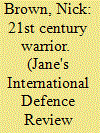

|
|
|
|
|
| Publication |
2013.
|
| Summary/Abstract |
Like many forces around the world, the British army is a force in flux. It is trying to balance financial austerity with restructuring its forces and getting back to preparing to fight wars away from the major distraction of constant operations over the last decade.
|
|
|
|
|
|
|
|
|
|
|
|
|
|
|
|
| 2 |
ID:
118204
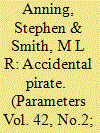

|
|
|
| 3 |
ID:
120285
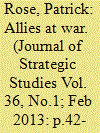

|
|
|
|
|
| Publication |
2013.
|
| Summary/Abstract |
This article compares the philosophy and practice of command in the British and US Armies during the Italian Campaign of 1943-44. It assesses pre-war influences on the command approach adopted by each army, and shows how refinements derived from wartime experience enabled British and American commanders to successfully utilise mission command principles to outfight the German Army in the latter years of World War II. This examination directly challenges the historical consensus that Allied commanders were disadvantaged by an inability to exploit the advantages of mission command, and that the German Army retained superior command practices, despite its other failings, throughout the fighting between 1939 and 1945. These conclusions hold additional relevance to modern military organisations which have emphasised mission command as the optimal solution to effective command in battle since the 1980s, but from an inaccurate understanding of German, British and American command traditions and experience that persists to this day.
|
|
|
|
|
|
|
|
|
|
|
|
|
|
|
|
| 4 |
ID:
159440
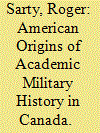

|
|
|
|
|
| Summary/Abstract |
C. P. Stacey (1906–1989), Canada’s first academic military historian, owed his career to opportunities in the United States. He was at an academic dead end when Princeton University provided a Ph.D. fellowship and employment. Carnegie Endowment funding allowed him to publish his thesis as Canada and the British Army, the book that secured his future. It remains the foremost account of how confrontation between Britain and the United States in the 1840s–1860s brought the creation of the modern Canadian state in 1867, which helped set the course for rapprochement and then alliance among the three nations.
|
|
|
|
|
|
|
|
|
|
|
|
|
|
|
|
| 5 |
ID:
096979
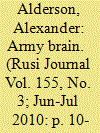

|
|
|
| 6 |
ID:
100370
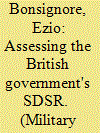

|
|
|
| 7 |
ID:
120458
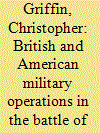

|
|
|
|
|
| Publication |
2013.
|
| Summary/Abstract |
In summer 2006, elements of the British Army were deployed to Helmand province in southern Afghanistan. The US Army followed with a surge in 2009 and 2010. The British and American military forces attempted to construct a counterinsurgency (COIN) approach to win the war in Helmand from 2006 until 2011, but the operational approach implemented was most often that of conventional warfighting. The inability to successfully implement COIN owed not to a lack of will, but rather to short tours, mission command, a lack of available resources, the particular situation on the ground in Helmand and the propensity of the Taliban to launch major conventional operations during much of the period in question.
|
|
|
|
|
|
|
|
|
|
|
|
|
|
|
|
| 8 |
ID:
078710
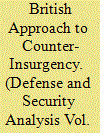

|
|
|
| 9 |
ID:
115507


|
|
|
| 10 |
ID:
133798
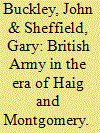

|
|
|
|
|
| Publication |
2014.
|
| Summary/Abstract |
Negative myths about the British Army's performance, especially during the Great War, obscure the reality of an institution that learned and improvide throughout both world wars
The performance of the British Army in the two world wars has been the subject of much scrutiny in both scholarly and popular history. The latter has long been dominated by the perception of an underperforming army fighting under incompetent leadership in a futile First World War, in contrast to a more successful and effective force supporting a just cause in the Second. Yet, John Buckley and Gary Sheffield argue, sound scholarly research paints a much more nuanced picture of an institution that between 1914 and 1945 underwent a rich learning process that must be understood in its entirety.
|
|
|
|
|
|
|
|
|
|
|
|
|
|
|
|
| 11 |
ID:
131904
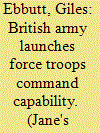

|
|
|
| 12 |
ID:
147151
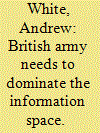

|
|
|
| 13 |
ID:
160026
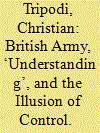

|
|
|
|
|
| Summary/Abstract |
Over the past decade, Western military doctrines concerned with matters of irregular warfare and counterinsurgency have emphasised the requirement for properly ‘understanding’ the social, political and cultural environments in which those militaries may operate; the so-called human and socio-political ‘terrain’. This has led to a number of advancements and initiatives designed to facilitate the way that militaries may enhance that understanding. One of those initiatives has been the emergence from within the British military of a doctrine – JDP 04 ‘Understanding’ – designed for that purpose. Using that doctrine and other subsequent publications as a template, this article will examine the utility of ‘understanding’ for those commanders seeking to match military activities with political ends. It proposes that while any advances in understanding the operating environment are to be applauded, the ‘understanding’ of greatest importance is that relating to the feasibility of the strategic objectives at hand. If those objectives lack inherent feasibility, then the development of subordinate forms of understanding, particularly in relation to the socio-political dynamics of target societies, will likely only serve to slow the process of failure.
|
|
|
|
|
|
|
|
|
|
|
|
|
|
|
|
| 14 |
ID:
161359
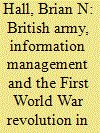

|
|
|
|
|
| Summary/Abstract |
Information Management (IM) – the systematic ordering, processing and channelling of information within organisations – forms a critical component of modern military command and control systems. As a subject of scholarly enquiry, however, the history of military IM has been relatively poorly served. Employing new and under-utilised archival sources, this article takes the British Expeditionary Force (BEF) of the First World War as its case study and assesses the extent to which its IM system contributed to the emergence of the modern battlefield in 1918. It argues that the demands of fighting a modern war resulted in a general, but not universal, improvement in the BEF’s IM techniques, which in turn laid the groundwork, albeit in embryonic form, for the IM systems of modern armies.
|
|
|
|
|
|
|
|
|
|
|
|
|
|
|
|
| 15 |
ID:
189259
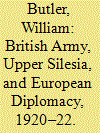

|
|
|
|
|
| Summary/Abstract |
At the end of the First World War, Britain was at the limit of its capabilities, both militarily and diplomatically. Despite large reductions in the size of its armed forces, it had an increasing number of responsibilities as a victorious power. One of these responsibilities was to ensure the success of a plebiscite in Upper Silesia. It had little desire to do this but was compelled to provide support in order to counter French influence in the region, having to do so with minimal expertise and manpower. This article explores the decision-making which occurred in relation to the British role in Upper Silesia, placing it within the wider context of British strategic and diplomatic policy in the years immediately after the First World War, while also assessing the use (or not) of British civilian and military experts on the ground. Belatedly taking a role in the region certainly helped to aid a situation which was spiralling out of control, but highlights how a short-term outlook on foreign policy and decision-making hindered British efforts to exert influence in the region and further afield.
|
|
|
|
|
|
|
|
|
|
|
|
|
|
|
|
| 16 |
ID:
078705
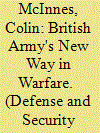

|
|
|
| 17 |
ID:
116260
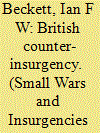

|
|
|
|
|
| Publication |
2012.
|
| Summary/Abstract |
The article aims to offer a survey of the historiographical analysis of British counter-insurgency practices and campaigns since the publication of Armed Forces and Modern Counter-insurgency, edited by the author and the late John Pimlott in 1985. It is argued that the volume in question was influential at a time when there was little academic interest in counter-insurgency in Britain. Moreover, the subject generally had been little studied in Britain in the past beyond work by a handful of military writers and theorists. Arguably, the analytical framework followed in Armed Forces and Modern Counter-insurgency holds its value even after over a quarter of a century. Since the 1980s, however, it has become apparent that the subject is of increasing academic interest, not least in terms of the ongoing debate on the nature and application of the concept of 'minimum force' in British campaigns.
|
|
|
|
|
|
|
|
|
|
|
|
|
|
|
|
| 18 |
ID:
078709
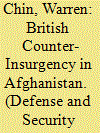

|
|
|
| 19 |
ID:
167188
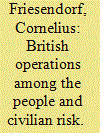

|
|
|
|
|
| Summary/Abstract |
Debates on military intervention and small wars often include the claim that soldiers should operate among civilians in order to avoid civilian casualties and to protect civilians against third-party violence. This article, by contrast, points at negative unintended consequences of military operations taking place in close proximity to local populations: it argues that also risk-tolerant militaries cause civilian casualties and that their presence triggers third-party violence against civilians. The British military, in particular the British Army, exported risk-tolerant practices from Northern Ireland to the Balkans, with sporadic success. But in southern Iraq and in Helmand, British ground operations harmed civilians. The findings suggest that the chances for protection are better in operations where levels of violence are relatively low than in counterinsurgency where troops face ruthless and well-endowed enemies operating among civilians.
|
|
|
|
|
|
|
|
|
|
|
|
|
|
|
|
| 20 |
ID:
116250
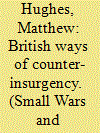

|
|
|
|
|
| Publication |
2012.
|
| Summary/Abstract |
This essay introduces the special issue, drawing together the different studies around the central theme of the nature of the force used by Britain against colonial insurgents. It argues that the violence employed by British security forces in counter-insurgency to maintain imperial rule is best seen from a maximal perspective, contra traditional arguments that the British used minimum force to defeat colonial rebellions. It shows that the use of force became more difficult especially after the Amritsar massacre in 1919. The presence of white settlers in counter-insurgencies - such as in Kenya in the 1950s - accelerated abuse by security forces and complicated the measured use of force against insurgents by the colonial state. The article concludes by drawing lessons from the British experience of counter-insurgency to unconventional military operations today, suggesting that in some situations the use of maximal force is still an option in counter-insurgency.
|
|
|
|
|
|
|
|
|
|
|
|
|
|
|
|